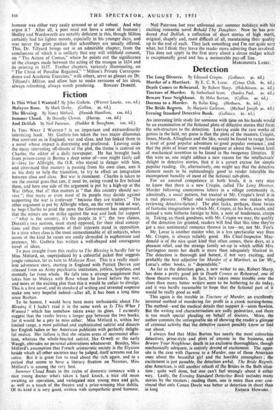Detection
AN interesting little study for someone with time on his hands would be an examination of the fictional plots of detective stories that form
the sub-structure to the detection. Leaving aside the rare works of
genius in the field, my guess is that the plots of the masters, Crispin, Innes, Marsh, Allingham and the like, would be found to•range from a level of good popular adventure tol good popular romance and that the plots of lesser men would stagnate at about the lowest level of mechanical invention to be found in the twopenny libraries. If this were so, one might adduce a new reason for the intellectuals' delight in detective stories, that it is' a covert excuse for simple popular reading. Or, alternatively, one might say that the detective element needs to be outstandingly good to render tolerable. the
incompetent banality of most of the fictional sub-plots. "
For an assured competence at both levels, it is very nice to know that there is a new Crispin, called. The Long Divorce. Murder following anonymous letters in a village community is, admittedly, a usual pattern, but treated at Mr. Crispin's level it is a real pleasure. (What odd value-judgements one makes when reviewing detective-fiction.) The plot lacks, perhaps, those twists of fantastic imagination in which .Mr. Crispin, at his best, excels, and instead a note hitherto foreign to him, a note of tenderness, creeps in. Taking, as thank goodness, with Mr. Crispin we may, the quality of the detection for granted, readers Will find that this time they've got a nice sentimental romance thrown in too—no, not Mr. Fen's_
Mr. Lorac is another master who, in a less spectacular way than Mr. Crispin, is always reliably good. His Chief-Inspector Mac- donald is of the nice quiet kind that often comes, these days, as a pleasant relief, and the strange family set-up in which selfish Mrs. Farrington meets her death is more than: adequately blocked in. The detection is thorough and honest, if not very exciting, and probably the best adjective for Murder of a Martinet, as" for 'Mr* Lorac's other books, is " dependable."
As far as the detection goes, a new writer to me, Robert Sharp, has done a pretty good job in Death Comes to Rehearsal, one 'cif those theatre murders. In fact, he's taken more trouble over the clues than many better writers seem to be bothering to do today; and it was hardly reasonable to hope that the fictional part of it would be really good as well.
This again is the trouble in Tincture of Murder, an excellently invented method of murdering for profit in a crook nursing-home. The method—and the medical details that support it—seem flawless. But the writing and characterisation are sadly pedestrian, and there is too much special pleading on behalf of doctors. More, the author commits the unforgivable sin of showing the reader a glimpse of criminal activity that the detective cannot possibly know or find out about.- 1 always find that Miles Burton has nearly the most colourless detectives, prose-style and plots of anyone in the business, and Beware Your Neighbour, death in an exclusive thoroughfare, though mechanically adequate, is entirely devoid of excitement. The oppo- site is the case with D‘ienna to a Murder, one of those American ones about the beautiful girl and the horrible atmosphere ; the excitement is just passable, the detection awful. The Bride Regrets. also American, is still another rehash of the Brides in the Bath situa- tion ; quite well done, but one can't feel 'strongly about it either way.- Lastly, the Evening Standard Detective Book includes many stories by the masters ; reading them, one is more than ever con- vinced that only Conan Doyle was better at detection in short than






























 Previous page
Previous page